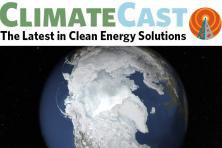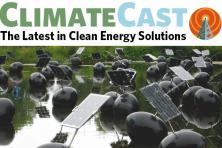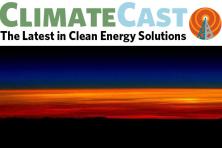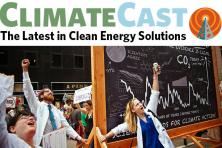Election results suggest a US committed to climate action
On election day this year, the climate won--and fossil fuels lost bigly. Newly elected governors, mayors and state legislators from coast to coast won on platforms from carbon pricing, to clean energy incentives. Big Oil arguably lost particularly hard in Washington State; voters in east King County elected Democrat Manka Dhingra to the state senate--tipping the scale of the state legislature in favor of Democrats, and giving Governor Inslee the support needed to move forward statewide climate action. Don Orange won the third seat on the Port of Vancouver’s Board of Commissioners, beating the candidate favored by oil and rail-industry donors. Orange’s win most likely dooms the proposed Tesoro-Savage oil-by-rail terminal. If built, that project would be the largest of its kind in the United States.
Change is happening, and states are leading the charge
The Massachusetts state legislature voted to commit the state to meeting greenhouse gas reduction goals as outlined in the Paris Climate Accord. Alaska’s Governor signed an order establishing a climate change strategy for the state. California’s Governor, Jerry Brown, has entered into talks with European Union leaders to discuss the possibility of creating a common carbon market. A new report highlights that US EV charging networks have grown from just over 5,000 to over 50,000 in just six years. Former Secretary of the UN Framework on Climate Change, Christiana Figueres, authored an op-ed affirming the significance of these combined actions: despite Trump, the world is turning a corner on climate change.
Unbeatable, unflinching clean energy presses on
Clean energy momentum presses on--which is why clean energy jobs are needed now more than ever before. The US Bureau of Labor Statistics reports that wind energy technician is one of the fastest growing jobs in the country. The construction of wind and solar farms is helping to speed up the retirement of nuclear and coal plants, as it's proving cheaper to simply build new, renewable energy sites than upgrade older coal or nuclear plants. Renewables are even taking hold in states that voted overwhelmingly for Trump. Solar markets have expanded to such an extent that they are now cost-competitive with coal and fossil gas, and rooftop solar is expanding thanks to cheap technology and a local push for energy independence. Cape Verde, a small island archipelago nation off Africa’s northwest coast, has pledged to run on 100% energy in less than a decade. And in Germany, consumers recently got a weekend of free electricity as wind power generation reached a record high during a storm.
A swirling mass of contradictions
Last week, the Trump administration released the National Climate Assessment, a Congressionally-mandated report which affirms the prevailing scientific consensus that climate change is a serious, present, and overwhelmingly man-made problem. The report’s findings are, to put it mildly, in a state of tension with the Trump administration’s efforts to deny the urgency of global warming and to lend support to the collapsing coal industry. Truer to its usual form, the administration published a draft analysis of its plan to repeal the Clean Power Plan; the draft plan made headlines for citing that the very plan they hope to repeal would prevent thousands of premature deaths each year. In another blow to the administration’s pro-coal narrative, Armstrong Energy, a Kentucky-based coal company, has filed for bankruptcy, the first to do so since Trump’s election. A Kentucky-based coal report also shows no sustained employment rebound since Trump’s election one year ago.
Impacts and their Implications
As if sea level rise weren’t a big enough problem already, new scientific findings show that as winds intensify in Antarctica from rising temperatures, they’re speeding up the flow of the Totten Glacier, which could, in turn, create more sea level rise. A new report shows that 3C of global warming could lock in irreversible sea level rise that would inundate some cities across the globe. New Zealand is considering becoming the first country in the world to offer a special visa to climate refugees. Another report analyzing over a century of measurements from weather stations shows that the first freeze has been arriving further and further into the calendar year. The UN reports that this year will be among the three hottest on record -- a sign of accelerating climate change. In New Delhi, smog has reached such unhealthy levels that breathing the air is thought to be the equivalent of smoking 44 cigarettes per day.
Backwards maneuvers
The Trump administration has opted to exit the Extractive Industries Transparency Initiative (EITI), a global initiative that requires member nations to disclose their revenues from oil, gas and mining assets in an effort to fight corruption. House Republicans are looking to eliminate the $7,500 electric vehicle tax credit, however their proposed tax overhaul slashes tax rates nearly in half for corporations, and expands the ability of businesses to write off shale drilling and related industry equipment, while keeping existing oil industry tax breaks in tact. The head of the EPA has dismissed members of the agency’s scientific and public health advisory board and replaced them with appointees of his choosing. One appointee is a man who once claimed that the air in the US was “a little too clean for optimum health.”
Pacific Northwest news
Oregon’s Governor, Kate Brown, recently made headlines for signing two executive ordersthat will triple the number of electric vehicles in the state by 2020, and will impose sweeping green energy mandates on new construction projects. In Medford, Oregon, 37,000 solar panels are being installed -- enough to power 2,000 homes! Washington State researchers report that landslides will become more common in the Pacific Northwest due to a changing climate (earlier snowmelt, more rain, and less cohesive soils.) Researchers have documented eelgrass wasting disease in Puget Sound -- a plant that is essential to the health of herring and salmon. An increase in water temperatures, due to a changing climate, is may be contributing to the spread of the disease.





